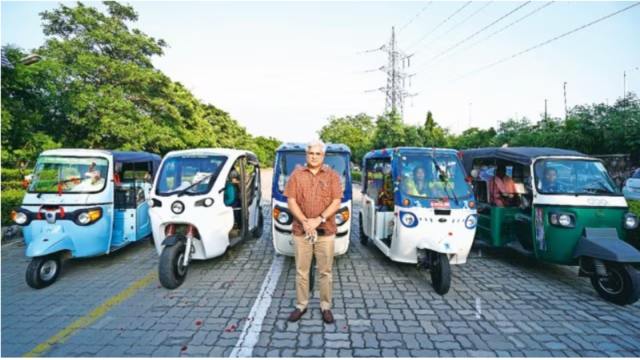
Madhav Pai and Kaustubh Gosavi
Three-wheeler auto-rickshaws are an important part of the urban transport system in India. They play a crucial role in promoting public transport usage and reducing private motor vehicle trips in cities. Since 2014, Gujarat has had 4,73,023 registered auto-rickshaws, with the sector witnessing a 23 per cent increase in registrations from 2019 till date. Out of the total registered auto-rickshaws, 66,448 comply with Bharat Stage (BS) emission standards I, II, III or IV, which regulate the output of air pollutants. These vehicles were collectively responsible for emitting 430 metric tonnes (MT) of carbon monoxide (CO), 66 MT of particulate matter (PM), and 451 MT nitrogen oxide (NOx) in Gujarat. They account for a worrying 17 per cent of the total CO emissions in the state. If all these autos were converted to electric vehicles, a substantial portion of these emissions could be mitigated.
Auto-rickshaws play a vital role in addressing the challenges of first and last-mile connectivity. They serve as an essential transport option in densely populated urban areas. Electric auto-rickshaws (e-autos) have the potential to transform the transport system by contributing to a cleaner environment and providing long-term economic benefits. According to a study conducted by WRI India, e-autos exhibit a lower total cost of ownership (TCO) when compared to their conventional counterparts powered by compressed natural gas (CNG), petrol, or diesel. TCO encompasses all expenses associated with purchasing, operating, and maintaining a vehicle throughout its lifespan. For a 100-km journey in Gujarat, the TCO per km for a CNG-fueled auto-rickshaw stands at Rs 4.60, while an e-auto with subsidies (considering a total subsidy of Rs 1 lakh, including FAME and Gujarat state subsidies) reduces this cost significantly to just Rs 2.8.
Moreover, the daily running range of ICE autos of 100-150 km highlights the suitability of e-autos in addressing questions related to their viability to travel long distances. The earnings of auto-rickshaw drivers range between Rs 200-750 per day — the vehicles, therefore also have income-related benefits.
However, there are barriers to the widespread adoption of e-autos in the state. Some of these barriers include a lack of awareness and inadequate charging infrastructure. Many auto-rickshaw drivers and passengers remain unaware of the benefits of e-autos, such as lower operating and maintenance costs, higher performance and lower noise levels. There is a need to improve the charging infrastructure network, battery swapping facilities and service centres for e-autos in Gujarat. All this will also address the difficulties encountered in sourcing spare parts for e-autos or finding skilled technicians for servicing the vehicles.
The Gujarat Electric Vehicle Policy 2021 offers incentives and subsidies to individual vehicle owners. It’s a commendable step that will stimulate EV manufacturing, and allocate funds for charging infrastructure within the state. The state’s policy is also in sync with the Centre’s current policy to attract investments in e-vehicles. Moreover, India is witnessing an increased demand for e-mobility across all the states. Gujarat has a great opportunity to learn from the experiences of other states and come up with solutions that will facilitate a just transition to electric vehicles, including e-autos.
E-autos present a compelling opportunity to transform the urban mobility sector, not only by providing a cleaner and quieter alternative to traditional autorickshaws but also by reducing fuel and maintenance expenses. Gujarat’s EV policy has set an ambitious target of having 70,000 registered e-autos by July 2025.
The time has come for Gujarat to take decisive action by acknowledging the role of e-autos in improving air quality and people’s health.
Pai is Chief Executive Officer (CEO) at WRI India and Gosavi is Consultant, Electric Mobility at WRI India. Views are personal


